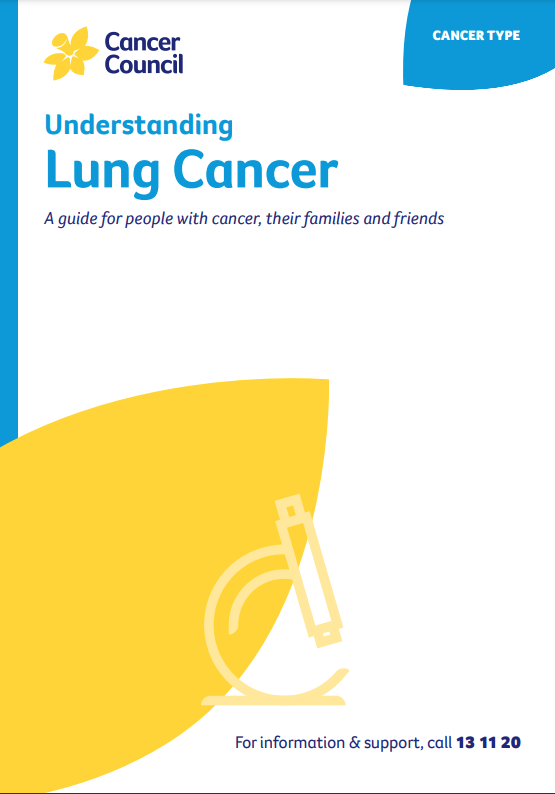- Home
- Lung cancer
- Diagnosis
- Staging and prognosis
Staging and prognosis for lung cancer
These tests will help show what type of lung cancer you have and how far it has spread. Called staging, this helps your doctors recommend the best treatment for you.
Learn more about:
Lung cancer by stage
Both non-small cell lung cancer (NSCLC) and small cell lung cancer (SCLC) are staged using the TNM (tumour-nodes- metastasis) system, which considers the size of the tumour, whether it has affected lymph nodes and whether it has spread. This information may be combined to give the lung cancer an overall stage of 0, 1, 2, 3 or 4 (often written in Roman numerals as I, II, III or IV).
Sometimes, SCLC is staged using a different system in which the cancer is classified as either limited stage or extensive stage. For more information about these 2 staging systems, see the tables below.
TNM staging system
In the TNM system, each letter is given a number (and sometimes another letter) to show how advanced the cancer is. For example, T1 means the tumour is 1 cm or smaller, while T4 means the tumour is more than 7 cm, or has spread into nearby organs, or there are 2 or more separate tumours in the same lung.
| stage 1 | The cancer is no bigger than 4 cm and hasn’t spread outside the lung or to any lymph nodes. | early |
| stages 2–3 | The cancer can be any size and may have spread to nearby lymph nodes, other parts of the lung, the airway, or surrounding areas outside the lung. | locally advanced |
| stage 4 | The cancer can be any size. It may have spread to lymph nodes and either to the other lung, to fluid in the pleura around the lungs or the heart, or to another part of the body such as the liver, bones or brain. | advanced |
Staging SCLC
Sometimes, SCLC is staged using a 2-stage system in which the cancer is classified as either limited disease or extensive disease.
| limited disease (stages 1–3) | Cancer is only on one side of the chest and in one part of the lung; nearby lymph nodes may also be affected. |
| extensive disease (stage 4) | Cancer has spread to the other lung, to lymph nodes on the other side of the chest or to other areas in the body. |
Prognosis
Prognosis means the expected outcome of a disease. You may wish to discuss your prognosis and treatment options with your doctor, but it is not possible for anyone to predict exactly how the disease will respond to treatment. Instead, your doctor can give you a general idea of the outlook for people with the same type and stage of lung cancer.
To work out your prognosis, your doctor will consider:
- your test results
- the type and stage of lung cancer
- the rate and extent of tumour growth
- other factors such as your age, fitness and overall health, and whether you smoke or vape.
Discussing your prognosis and thinking about the future can be challenging and stressful. It is important to know that although some statistics for lung cancer can be frightening, they are an average and may not apply to your situation. Talk to your doctor about how to interpret any statistics that you come across, as well as the best and worst possible outcomes. This information can help you make treatment decisions.
As in most types of cancer, the outcomes of lung cancer treatment tend to be better when the cancer is found and treated early. Newer drug treatments such as immunotherapy and targeted therapy have given promising results in many people with advanced lung cancer and are bringing hope for a longer, healthier life to those who have lung cancer that has spread.
For certain circumstances, these therapies are now being used for earlier-stage lung cancer. For more on this see Targeted therapies and Immunotherapy.
→ READ MORE: Your health care team
Podcast: Tests and Cancer
Listen to more of our podcast for people affected by cancer
More resources
Dr Malinda Itchins, Thoracic Medical Oncologist, Royal North Shore Hospital and Chris O’Brien Lifehouse, NSW; Dr Cynleen Kai, Radiation Oncologist, GenesisCare, VIC; Dr Naveed Alam, Thoracic Surgeon, St Vincent’s Hospital, Epworth Richmond, and Monash Medical Centre, VIC; Helen Benny, Consumer; Dr Rachael Dodd, Senior Research Fellow, The Daffodil Centre, NSW; Kim Greco, Specialist Lung Cancer Nurse Consultant, Flinders Medical Centre, SA; Caitriona Nienaber, 13 11 20 Consultant, Cancer Council WA; Marco Salvador, Consumer; Janene Shelton, Lung Foundation Australia – Specialist Lung Cancer Nurse, Darling Downs Health, QLD; Prof Emily Stone, Respiratory Physician, Department of Thoracic Medicine and Lung Transplantation, St Vincent’s Hospital Sydney, NSW; A/Prof Marianne Weber, Stream Lead, Lung Cancer Policy and Evaluation, The Daffodil Centre, NSW.
View the Cancer Council NSW editorial policy.
View all publications or call 13 11 20 for free printed copies.

